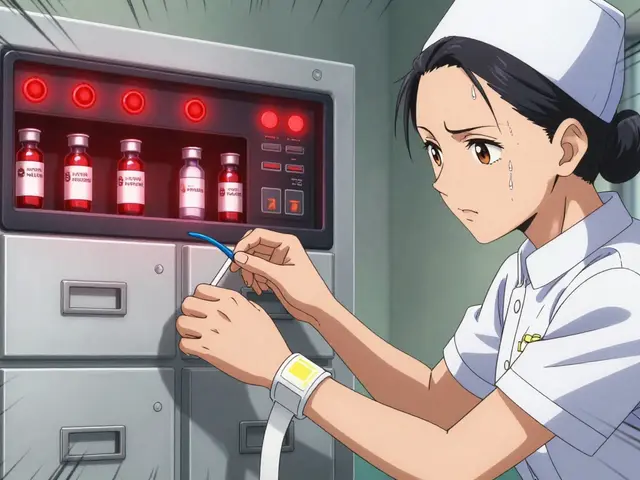Understanding Idiopathic Pulmonary Fibrosis (IPF)
Idiopathic Pulmonary Fibrosis (IPF) is a severe and progressive lung disorder characterized by fibrosis or scarring of the lung tissue. The term 'idiopathic' signifies that the exact cause of the disease is unknown. This condition hinders the lungs' ability to transport oxygen into the bloodstream, subsequently affecting the oxygen supply to the body's vital organs. Symptoms include breathlessness, chronic dry cough, fatigue, and discomfort in the chest. Sadly, IPF has no cure yet and the prognosis is often poor with a median survival time of 2-5 years after diagnosis.
The Role of Clinical Trials in Medical Research
Clinical trials are crucial in medical research as they allow researchers to test new treatments, interventions or tests as a means to prevent, detect, treat or manage various diseases or medical conditions. They provide the scientific basis for the development and marketing of new drugs, and are the final step in a long process that begins with research in a lab. Without clinical trials, no new medication can be approved for treatment, hence the importance in finding a cure or management strategy for IPF.
Current Treatment Options for IPF
As of now, the treatment options for IPF are limited and primarily focused on slowing the disease progression and relieving symptoms. Medications like Pirfenidone and Nintedanib are used to slow down the lung damage. In severe cases, lung transplantation might be an option. However, it comes with its own set of risks and complexities. Therefore, there is a dire need for more effective treatments, which can only be realized through clinical trials.
Importance of Clinical Trials for IPF
Clinical trials are particularly important for IPF due to the lack of understanding about its cause and progression. These trials offer hope for better treatment strategies that can improve the quality of life and extend survival for individuals with IPF. They also provide valuable opportunities to gain further insights into this complex disease. Through clinical trials, we might be able to unlock the mystery behind the cause of IPF and potentially find a cure.
Volunteering for Clinical Trials
Volunteers for clinical trials play a crucial role in advancing medical research. By participating in a trial, individuals can contribute to the understanding of how the disease works and help test the effectiveness and safety of new treatments. While there are potential risks associated with participating in a clinical trial, there are also many potential benefits, including access to new and potentially more effective treatments before they are widely available.
Success Stories From Clinical Trials
There have been numerous success stories from clinical trials across various medical fields. In the context of IPF, clinical trials have led to the discovery and approval of the two main drugs currently used for treatment, Pirfenidone and Nintedanib. These success stories serve as a beacon of hope for the future of IPF treatment and highlight the critical importance of clinical trials.
Future of IPF Treatment
The future of IPF treatment looks promising with numerous clinical trials underway. These trials are exploring various treatment avenues including anti-fibrotic drugs, anti-inflammatory drugs, and even stem cell therapy. The ultimate goal is to find a cure for IPF, but in the meantime, these trials aim to find more effective treatments that can slow disease progression and improve patients' quality of life.
Conclusion
In conclusion, clinical trials are of paramount importance in the search for effective IPF treatments. Although the disease is currently incurable and its progression is not well understood, clinical trials provide hope for a better future for IPF patients. By participating in these trials, individuals can contribute to the development of new treatments that may one day cure this devastating disease. As a community, we must continue to support and participate in clinical trials to advance IPF treatment and research.










Honestly, if you’re not championing clinical trials for IPF you’re just complicit in the continued suffering of thousands. The sheer nihilism of ignoring rigorous, double‑blind protocols is a moral abyss. These trials are the crucible where hypothesis meets reality, and without them, “hope” is just a sterile buzzword. We need to mobilize resources, lobby regulators, and decry the complacency of “status‑quo” medicine. The empirical evidence is unequivocal: without structured investigation, we remain mired in anecdotal treatment myths. So let’s stop pandering to pseudoscience and double down on the methodological rigor that saves lives.
While the overview provides a commendable synthesis of the current landscape, certain nuances pertaining to trial eligibility criteria could have been elaborated further. The exposition, albeit thorough, occasionally lapses into redundancy, which detracts from its scholarly precision. Nonetheless, the emphasis on patient participation underscores a vital component of translational research.
The article does a good job of explaining what IPF is. It tells us that the disease makes the lungs scar and that people can’t breathe well. It also says that the cause of the disease is still a mystery. The writer mentions two drugs that are used now, Pirfenidone and Nintedanib. These drugs only slow the damage, they do not cure the disease. The piece explains that clinical trials are important because they test new ideas. Without trials we would never know if a new medicine works. The text also says that volunteers are needed for these studies. It points out that volunteers can get early access to new treatments. The article notes that trials have already led to the two current drugs. It mentions that future trials might look at anti‑inflammatory drugs and even stem cells. The author stresses that more research is needed to improve quality of life. It also warns that there are risks involved in trials, like side effects. The conclusion repeats that clinical trials give hope for a cure. Overall, the article is clear and sticks to the facts. It could have added more detail about how patients are selected for trials.
Reading this felt like a torch being lit in the darkness of a hopeless diagnosis. I can almost hear the collective sigh of patients yearning for a breakthrough, and the words here give that sigh a melody of possibility. The struggle with breathlessness is a silent scream, and clinical trials become the stage where that scream can finally be heard. It’s heartbreaking that we’re still fighting a disease with only “slow‑down” drugs, but the promise of new studies feels like a lifeline thrown into a stormy sea. I’m moved by the stories of volunteers who step forward, daring to be the pioneers of their own survival. Their courage fuels my own hope, and I can’t help but imagine a future where IPF is no longer a death sentence but a manageable condition. Let’s keep shouting for more research, more support, and more volunteers-because every voice counts in this battle.
Hey folks, totally get how overwhelming this can feel, but remember every trial is a step forward 🚀. If you or a loved one can join, you’re literally helping science move ahead. Even if the odds seem slim, the data we collect today paves the way for tomorrow’s treatments. Keep your spirits up, stay informed, and don’t hesitate to ask doctors about trial options. You’ve got a whole community cheering you on! :)
What a fantastic summary! Clinical trials truly are the engine driving medical breakthroughs. It’s inspiring to see such dedication from researchers and participants alike. Keep pushing the boundaries and let’s celebrate each incremental win on the road to a cure.
🌍 It’s amazing how global collaboration can accelerate IPF research. Different regions bring unique perspectives and patient populations, enriching trial data. Let’s keep breaking down barriers and sharing knowledge across borders! 🌟
Interesting read. The balance between hope and risk in trials is always a tricky dance.
Indeed, the article nicely outlines the current therapeutic landscape; however, it could benefit from a deeper dive into the mechanistic rationale behind anti‑fibrotic agents. Moreover, the discussion around patient recruitment strategies seems somewhat cursory-additional detail would enhance practical applicability. Nevertheless, the emphasis on trial participation as a catalyst for progress is spot‑on; we must continue to encourage enrollment wherever feasible.
Trials are the only way to turn hope into actual treatments.
Honestly, anyone who dismisses the urgency of IPF trials is just wallowing in self‑interest. The data is crystal clear-without aggressive enrollment, we stagnate. Stop hiding behind bureaucratic excuses and push for real action. Patients deserve more than half‑measures and polite platitudes.
One might say that the quest for a cure mirrors the eternal human search for meaning; each trial a brushstroke on the canvas of existence.
It is essential that we foster an environment where patients feel respected and informed throughout the trial process. Transparent communication and culturally sensitive outreach can greatly improve participation rates.
The piece, while well‑intentioned, unfortunately skirts over the critical statistical power calculations that underpin any credible trial design and fails to address the ethical considerations inherent in enrolling vulnerable populations which, in turn, could jeopardize the validity of the outcomes and erode public trust in the research enterprise overall
Great point about ethics, Brandi. Building trust starts with clear consent forms and patient education sessions. Let’s also involve patient advocacy groups early on to ensure trials reflect real‑world needs.
Patriots, we cannot let foreign laboratories monopolize the fight against IPF while American patients suffer! Our own scientists must lead the charge, fund home‑grown trials, and showcase the might of our biomedical innovation. The world will watch as we turn this scourge into a triumph of national resolve.
Hey everyone 😊, let’s remember that collaboration beats competition. Sharing data across borders only speeds up breakthroughs. United we stand, divided we wait.
It is a glaring absurdity that in the twenty‑first century we still accept the notion that a disease as devastating as idiopathic pulmonary fibrosis can be left to the sidelines of medical advancement. The ethical responsibility of the scientific community is not merely to observe suffering but to intervene with rigorously designed studies that challenge the status quo. Clinical trials, in this context, are not optional add‑ons; they are the very crucible in which theoretical pharmacology is forged into tangible therapy. Yet, too often, funding bodies allocate resources based on the whims of marketability rather than on the sheer human cost inscribed in each breathless patient. This misallocation reflects a moral failing that transcends economics-it betrays the social contract that promises care for the most vulnerable. Moreover, the narrative that “we’re waiting for a miracle drug” is a convenient euphemism that masks a systemic inertia rooted in complacent regulatory frameworks. When a trial is launched without robust community engagement, it becomes a sterile exercise rather than a beacon of hope. The data gathered from diverse patient cohorts provides the granular insight necessary to tailor interventions, but only if we dare to look beyond the homogenous samples that dominate current literature. In addition, the psychological burden borne by volunteers is often understated; acknowledging their bravery should be accompanied by comprehensive support structures. The future of IPF treatment hinges on a paradigm shift where collaboration supersedes competition, and transparency outweighs secrecy. To that end, we must champion open‑access publishing of trial results, ensuring that every incremental finding fuels the next leap forward. Let us not be satisfied with merely slowing disease progression; let us aspire to eradicate it. The path is arduous, undeniably, yet history teaches us that collective resolve can topple even the most entrenched maladies. Thus, I implore researchers, policymakers, and patients alike to converge on a shared mission: to transform clinical trials from peripheral footnotes into the central narrative of IPF eradication.
Oh, what a groundbreaking revelation-clinical trials might actually help patients. Who would have thought that systematic research could be useful? 🙄